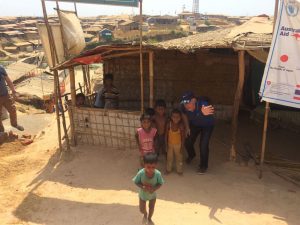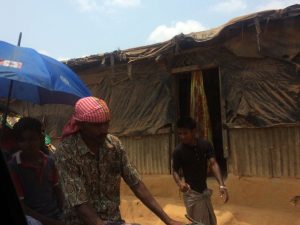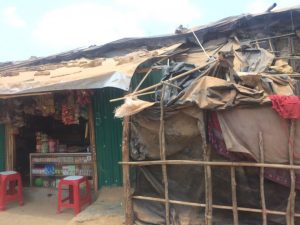Prof. Sebnem Koser Akcapar: Taipei, Taiwan

Dr. Şebnem Köşer Akçapar is Associate Professor at the Sociology Department, Koç University, Istanbul. She is a senior research fellow and executive board member at Migration Research Center (MiReKoc) and the founding Director of Center for Asian Studies (KUASIA) at the same university. Simultaneously, she is an associate member at Asia Centre at the University of Sussex. After completing her Ph.D. in Belgium, she moved to the United States as a post-doc fellow at the Institute for the Study of International Migration, Georgetown University. She taught graduate courses on Gender and Migration, Muslim Immigrants in Western Europe and North America, Politics of Migration and Integration Problems at Georgetown University’s BMW Center for German and European Studies. She was later appointed as the Director of Center for Eastern Mediterranean Studies of Georgetown University. She also worked as visiting professor between 2013-15 at South Asian University in New Delhi, India and taught on diaspora and transnationalism as well as on social stratification in Asia. Her research areas include marriage migration, forced migration, labor migration, highly-skilled migration, social networks in migration, diaspora formation, and political mobilization. Her current projects include Asian societies, return migration, and the integration processes of Syrian refugees in Türkiye and in West Asia.
Dr. Valentina Rita Scotti: Korea and Hong Kong
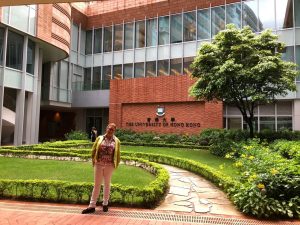
Dr. Valentina Rita Scotti works as Post-doctoral Researcher in Comparative Public Law at the Koç University Law School since 2016, where she holds a course on ‘Women and Law’. She received her Ph.D. in Comparative Public Law from the University of Siena, Italy in 2010 and a M.A. summa cum laude in International Relations at the LUISS ‘Guido Carli’ in 2007. She has been Post-doctoral fellow at the Department of Political Science of LUISS ‘Guido Carli’ University of Rome (2012-2016), where she also worked as Research Assistant during her Ph.D. At LUISS, she has hold classes as Adjunct Professor in Comparative Constitutional Law and in Institutions of Muslim Countries. She has also hold classes in several Italian and international courses as well as at the Jean Monnet Summer School “Parliamentary Democracy in Europe” and the Jean Monnet Winter School on “The Parliaments of Europe in Democracy Promotion and Constitutional Transitions”. She has been Temporary Professor for the Italian National School of Administration during the Training for MPs and Officers of the Parliament of the Union of Myanmar and for the Training in Institution-building for the Officers of the Afghan Wolesi Jirga held by the Italian Minister for Foreign Affairs and International Cooperation, the Italian Chamber of Deputies and the School of Government of LUISS ‘Guido Carli’. She extensively participated in international conferences and she has been part of numerous organizing committees for international symposiums. She is also member of the Scientific Boards of academic journals. Since 2017, she is the Chair of the Young Comparativists Committee Affiliates Advisory Group of the American Society of Comparative Law and since 2018 she co-chairs the Research Group on ‘Gender and Constitutions’ of the International Association of Constitutional Law. She publishes in international and Italian reviews and journals, as well as in edited books, on constitutionalism and human rights in the Mediterranean area (including gender rights), transjudicialism and legal cross-fertilization, and parliamentary cooperation.
Dr. Ilgım Veryeri Alaca: Singapore
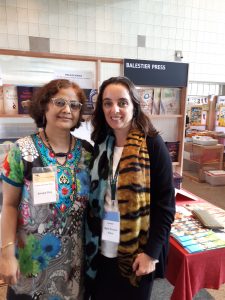
Prof. Nazmi Ağıl: Dhaka, Bangladesh
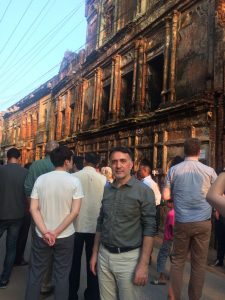
In April 2018, I had a chance to visit Bangladesh with a group of international journalists invited by the Bangladeshi government. We stayed in Dhaka for 5 days and two days we spent in Cox’s Bazar where we visited the recent Rohingya refugee camps. From the beginning to the end, this trip was an amazing experience for me which stimulated all my senses at the same time. As a ‘tourist’, of course I first noticed the differences between the two countries. I was struck by the enormous traffic of the capital city, by the never lessening honking, the street butchers and vendors selling sugar cane juice, local meals and dried fish, a boy walking his elephant in the main street, the way they carry every load on their heads, their joyous celebrations of the New Year on April 14, all the brilliant colors flying around, their alphabet that looks like clothes on a washing line, the secular minds of the governors and the nation which I thought would be more conservative, everyone’s fondness for taking pictures with us, the 120 km almost empty sandy beach, the misery of the Rohingya refugees despite all the good willing help of Bangladesh, and most of all, the people’s love of Türkiye and the big smile on their face when you approached them. Among the most striking sites was of course the most recent Rohingya Camp where around 700,000 refugees live. The area around Cox’s Bazaar was especially opened to settlement for them by cleaning of the trees and now the temporary bamboo houses stand on soft soil under the threat of a land slide in the imminent monsoon season. They have little water, and almost no drainage system, as their huge number even passes beyond the limits of international help organizations like the Turkish Red Crescent reaching out to only 40,000 of these people. The refugees cannot leave the camp, with many military check points. Adults are just idle and seem to have lost their hopes, they cannot think of returning their home unless the Myanmar Government guarantees their security. Children, though, most of whom are completely naked, easily forget everything when you play with them. All of these images kept echoing so strongly in my mind that in just one month after the trip I have created a poetry file trying to reach at their deeper implications. Below are some lines I wrote:
AT THE ROHINGYA REFUGEE CAMP
It is the prayers of the good souls all over the world for them in all languages, collected in the sack of a fat cloud, patiently waiting for its time to come, though at the moment they seem to strike the deaf doors of Heaven and drop dead like a unrequited greeting;
It is the cloth that lovingly and softly covers the naked bodies of little children-both boy and girl-posing for us, the hypocrite strangers just out of that the-above-pool party, in front of shaky bamboo houses, doomed to be flooded when the monsoon season comes;
It is the shine in the children’s eyes, and the gap between the teeth of a shy mother when we wave to say goodbye, that opens like the stretch of the courtyard with chicks, she once had in her village, whose houses have just been flattened by bulldozers in the still too, too fresh past;
It is all these that hover in the air of Kutupalong camp, hurled up by sporadic gusts of wind, gathered in the same small spot squeezed into the smallest space in a land already teeming with and brimming over with its native inhabitants;
It is all these that condense and solidify, touching the cold face both of the Gods and the shameless humans reflected upon an icy sky, all these that get ground in tiny particles to snow upon the nameless poor and homeless, belonging to no already defined cast;
It is not the mango, not the coconut, not the banana, nor the papaya, not even that archaic satanic Apple,
It is simply nothing, nothing but the dust!..
A ROHINGYA STORY
“We were kept for a few hours,
somewhere not far from the village,
we could hear the machines working.
When finally set free
we all ran towards the smoke
to find all our houses down,
even the chicken coops, bulldozed.
Let’s say we turned back now,
nobody can identify where
they formerly lived… except me,”
he says, with a wild light in his eyes
and a proud smile on his dry lips, which
come closer to my ear,
“my old, bed-ridden father,
he used to always have some papaya seeds
in his still-feeling right palm,
playing with them like prayer beads.
Now that the monsoon is over,
it must not have taken the sprouts long
to pop up their heads above the earth.”
ROHINGYA WOMAN POSING
1
It has been some time since
the sea began to recede on her face,
carrying all the little life forms
lingering in the shallow,
nuzzling the soft sand,
sucking the mold on a sunken boat,
or kissing the moss around a pebble.
With her gradually ebbing gum,
her teeth grow longer each day,
like white-washed rocks on the drying bottom,
above them, dimly, shine the two light houses:
her eyes.
2
She is hunger incarnate,
a big mouth with big teeth
on a rapidly thinning face;
just as the Cheshire cat,
who left behind its smile
when it disappeared,
time will eat up her image,
and only her mouth will stick
to my memory and I know
I will not pass
a day without the nightmare
in which, it will chase behind me
to take a big bite off
my fat, white ass.
Dr. Ilgım Veryeri Alaca: Singapore
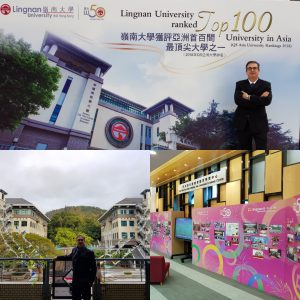
Michael Calikusu, born in Istanbul, Türkiye, has received a Juris Doctor degree in Law from Southern Methodist University, Texas, USA, Class of ’92 and a Bachelors of Business Administration (with Honors) from Texas Wesleyan University, USA, Class of ’89. He holds legal, finance and accounting related professional accreditations, as a member of the American and Texas Bar Association and the American and Virginia Commonwealth Certified Public Accountancy Board (CPA). Michael teaches a variety of business courses (Strategy, M&A, Finance) at KOC MBA programs and Executive Education seminars. His previous academic teaching experience includes the offerings of Strategy and Finance for the MBA and Executive MBA programs of Vienna University of Economics & Business and Webster University in Austria and at Kiev Mohyla Academy in Ukraine. He has also given numerous lectures as a visiting professional and speaker to leading American and European academic and business institutions, associations and summits. Michael has been a corporate trainer during his executive employment with Kraft Foods (Mondelez) and a founding member of its global Finance Academy as well as a trainer for Philip Morris, Reckitt-Benckiser and Pepsico. Currently he lives in Istanbul and in addition to his academic career, he is engaged as a Fast Moving Consumer Goods (FMCG) industry expert in Strategy & M&A consulting with international consulting firms and private equities and media outfits. Michael’s professional experience is with leading FMCG companies in the food, beverage and household cleaning sectors, and he has demonstrated general management, sales and business development, finance and strategic skills, executed mergers, acquisitions and divestitures in multiple countries across continents. Michael spent nearly 15 years with Kraft (Mondelez) as a US expatriate senior executive in a number of country-based operational assignments as well as in headquarter roles for global M&A activities. Before joining Kraft, he held various senior executive positions in operating units and in Headquarters, such as Reckitt-Benckiser (VP of Corporate Development), Pepsi-Cola Int’l (Director of Business Development), and PriceWaterhouseCoopers (Principal Consultant) in a number of developed and emerging countries.
Prof. Sumru Altuğ: New Delhi, India
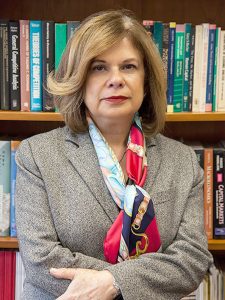
Sumru Altuğ (B.A., M.A. in Economics, Pittsburgh, 1978, 1980; Ph. D. in Economics, Carnegie-Mellon, 1985) is Professor of Economics at Koç University, Istanbul, Türkiye and a Research Fellow at the Centre for Economic Policy Research, London, UK. She also directs the KU-TUSIAD Economic Research Forum. She has held regular or visiting Assistant Professor positions at Minnesota (1984–1994), Wisconsin (1988–1989), Duke (1990–1991), and VPI and SU (1994–1995). She also held chaired or visiting professor positions at Durham and York in the UK during 1999–2002, the City University of Hong Kong during Fall, 2014 and Kyoto University during Fall, 2016. She served as an Associate Editor for the Economic Journal (2000–2003) and as a member of the Economic and Social Research Council Politics, Economics, and Geography (PEG) Research College, UK (2001–2003). Prof. Altuğ has published papers in the International Economic Review, Econometrica, Review of Economic Studies, Economic Theory, Journal of Money, Credit, and Banking, Journal of Macroeconomics, Macroeconomic Dynamics, Journal of Economic Dynamics and Control, International Finance, European Review of Economic History, International Journal of Forecasting, amongst others. She has also co-authored or co-edited five texts in macroeconomics and finance, including Dynamic Macroeconomic Analysis: Theory and Policy in General Equilibrium and Asset Pricing for Dynamic Economies, issued from Cambridge University Press in 2003 and 2008, respectively. Her most recent work is a monograph entitled Business Cycles: Fact, Fantasy, and Fallacy, published by World Scientific (2009). Prof. Altuğ is the recipient of the prestigious 2017 TUBITAK Award in the Social Sciences for her contributions to “structural econometrics, business cycles, and dynamic macroeconomic modelling.”
